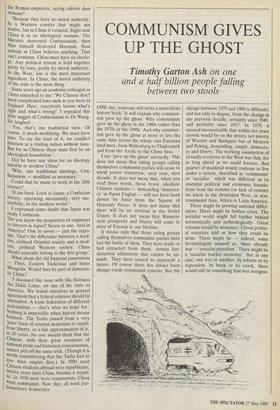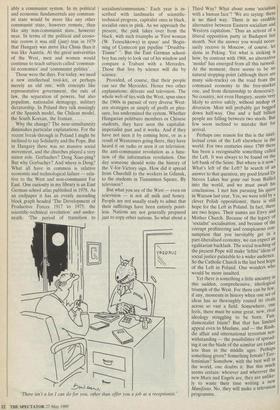COMMUNISM GIVES UP THE GHOST
Timothy Garton Ash on one and a half billion people falling between two stools
ONE day, someone will write a marvellous history book. It will explain why commun- ism gave up the ghost. Why communism gave up the ghost in the 1980s rather than the 1970s or the 1990s. And why commun- ism gave up the ghost at more or less the same time across the whole vast Eurasian land mass, from Wittenberg to Vladivostok and from the Arctic to the China Seas.
I say 'gave up the ghost' advisedly. This does not mean that ruling groups calling themselves communist parties will cease to wield power tomorrow, next year, next decade. It does not mean that, when you read these words, those brave, idealistic Chinese students — demanding 'democra- cy' in fluent English — will not have. been driven by force from the Square of Heavenly Peace. It does not mean that there will be no reversal in the Soviet Union. It does not mean that Western- style prosperity and liberty will come to most of Eurasia in our lifetime.
It means only that those ruling groups calling themselves communist parties have lost the battle of ideas. They have made or had extracted from them, certain fun- damental admissions that cannot be un- made. They have ceased to represent a future. Of course there has always been change inside communist systems. But the change between 1979 and 1989 is different, and not only in degree, from the change in any previous decade, certainly since 1949, and probably since 1917. In 1979, it seemed inconceivable that within ten years crowds would be on the streets not merely of Warsaw and Budapest but of Moscow and Peking, demanding, simply, democra- cy and liberty. The working assumption of virtually everyone in the West was that, for as long ahead as we could foresee, that quarter of mankind would continue to live under a system, described as 'communist' or 'socialist,' which was different in its essential political and economic founda- tions from the systems (or lack of system) we knew in the developed West, in non- communist Asia, Africa or Latin America.
There might be growing national differ- ences. There might be further crises. The socialist world might fall further behind economically and technologically. Great reforms would be necessary. Clever politic- al scientists told us how they could be done. There might be — indeed, some Sovietologists assured us, there already was — 'socialist pluralism'. There might be a 'socialist market economy'. But in any case, one way or another, by reform or by repression, by hook or by crook, there would still be something that was recognis- ably a communist system. In its political and economic fundamentals any commun- ist state would be more like any other communist state, however remote, than like any non-communist state, however near. In terms of the political and econo- mic system it was still (just) true in 1979 that Hungary was more like China than it was like Austria. At the great universities of the West, men and women would continue to teach subjects called 'commun- ist economics' and 'communist politics'.
Those were the days. For today, we need a new intellectual tool-kit, or perhaps merely an old one, with concepts like representative government, the rule of law, the separation of powers, but also populism, nationalist demagogy, military dictatorship. In Poland they talk musingly of the Spanish model, the Chilean model, the South Korean, the Iranian. . . .
Why the change? The near-simultaneity diminishes particular explanations. For the recent break-through in Poland I might be inclined to say Solidarity and the Pope. But in Hungary there was no massive social movement, and the churches played a very minor role. Gorbachev? Deng Xiao-ping? But why Gorbachev? And where is Deng? What all have in common is relative economic and technological failure — rela- tive to the West and non-communist Far East. One curiosity in my library is an East German school atlas published in 1978. As an endpaper it has an evenly ascending block graph headed 'The Development of Productive Forces 1917 to 1975: the scientific-technical revolution' and under- neath: 'The period of transition to socialism/communism.' Each year is in- scribed with landmarks of scientific- technical progress, capitalist ones in black, socialist ones in pink. As we approach the present, the pink takes over from the black, with such triumphs as 'First woman (W. Tereschkowa) in space' and 'Begin- ning of Comecon gas pipeline "Drushba- Trasse" '. But the East German school- boy has only to look out of his window and compare a Trabant with a Mercedes. ThOse that live by science will die by science.
Provided, of course, that their people can see the Mercedes. Hence two other explanations: detente and television. The whole web of ties with the West, spun since the 1960s in pursuit of very diverse West- ern strategies or simply of profit or plea- sure, has undermined the system. Whether Hungarian politburo members or Chinese students, they have seen the capitalist- imperialist past and it works. And if they have not seen it by coming here, or as a result of Westerners going there, they have heard it on radio or seen it on television: the anti-communist revolution as a func- tion of the information revolution. One day someone should write the history of the V-for-Victory sign. How did it spread from Churchill to the workers in Gdansk, to the students in Tiananrnen Square. By television?
But what you see of the West — even on television — is not all milk and honey. People are not usually ready to admit that their sufferings have been entirely point- less. Nations are not generally prepared just to copy other nations. So what about a Third Way? What about some 'socialism with a human face'? 'We are saying: there is no third way. There is no credible alternative between Eastern socialism and Western capitalism.' Thus an activist of a liberal opposition party in Budapest last month. Not the answer you would neces- sarily receive in Moscow, of course, let alone in Peking. Yet what is striking is how, by contrast with 1968, no alternative 'model' has emerged from all this turmoil. At the moment, there seems to be no natural stopping-point (although there are many side-tracks) on the road from the command economy to the free-market one, and from dictatorship to democracy. No country, not even Hungary, seems very likely to arrive safely, without mishap or diversion. Most will probably get bogged down half-way. One and a half billion people are falling between two stools. But few seem inclined to mistake that for arrival.
Perhaps one reason for this is the intel- lectual crisis of the Left elsewhere in the world. For two centuries since 1789 there has been a recognisable something called the Left. It was always to be found on the left bank of the Seine. But where is it now? What's left of the Left? In search of an answer to that question, my good friend Pr Steven Lukes has gone out from Balliol into the world, and we must await his conclusions. I met him pursuing his quest in Warsaw last year, Yes, we were told by a clever Polish oppositionist, there is still hope for the Left in Poland. In fact, there are two hopes. Their names are Envy and Mother Church. Because of the legacy of 'socialist' socialisation, and because of the corrupt profiteering and conspicuous con- sumption that you inevitably get in a part-liberalised economy, we can expect an egalitarian backlash. The social teaching of the present Pope will make 'leftist' ideas of social justice palatable to a wider audience. So the Catholic Church is the last best hope of the Left in Poland. One wonders who would be more insulted.
Yet there is something a little uncanny in this sudden, comprehensive, ideological triumph of the West. For there can be few, if any, moments in history when one set of ideas has so thoroughly routed its rivals across so vast a field. Somewhere, one feels, there must be some great, new, rival ideology struggling to be born. Fun- damentalist Islam? But that has limited appeal even to Muslims, and — the Rush- die affair and international terrorism not- withstanding — the possibilities of spread- ing it on the blade of the scimitar are rather less than in the middle ages. Perhaps something green? Something female? Eco- feminism? Somehow, with the best will in the world, one doubts it. But this much seems certain: whoever and wherever the new Marx and Engels are, they are unlike- ly to waste their time writing a new Manifesto. No, they will make a television programme.



















































 Previous page
Previous page